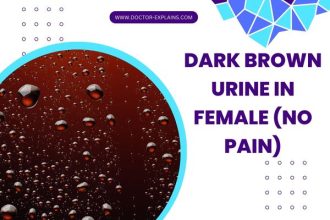You’ve probably noticed that your urine can change color every now and then, and sometimes it can be quite surprising.
You might wonder if you should be concerned about bright yellow or neon urine and if it could be related to the vitamin B12 supplement you’ve been taking.
I’m Dr. Esraa (a nephrology doctor), and I’ll explore whether vitamin B12 is the culprit behind your brightly colored urine and if you should be worried about it.
The Short Answer:
Vitamin B12 supplementation can indirectly cause bright yellow urine, but it’s not something you should be concerned about. This is due to the excess of riboflavin (vitamin B2) present in most B-complex supplements, which is excreted through urine, causing a change in color.
Bullet Summary:
- Vitamin B12 can cause bright yellow urine due to the presence of riboflavin (vitamin B2) combined with vitamin B12 in most multivitamins.
- This change in color is harmless and not a cause for concern.
- You should not stop taking vitamin B12 because your urine turns bright yellow.
- Other possible causes of bright yellow urine include dehydration, certain medications, and some medical conditions.
- You should worry about your urine color if it is consistently dark, bloody, or has a strong odor.
Does Vitamin B12 cause bright yellow urine?
Vitamin B12 itself doesn’t cause bright yellow urine. However, it is often found in B-complex supplements, which contain a mix of B vitamins, including riboflavin (vitamin B2).
Riboflavin is known for its bright yellow color (some also refer to the color change as orange or yellowish-green), and when your body has more of it than it needs, the excess is excreted through your urine, causing it to turn a neon yellow color. So, while vitamin B12 isn’t the direct cause, it might be indirectly responsible if you’re taking a B-complex supplement that contains riboflavin.
Should you stop taking vitamin B12 if your urine turns bright yellow?
If your urine turns bright yellow after taking a vitamin B12 supplement, it’s important to know that this is not a harmful side effect. Vitamin B12 is safe to take, and there is no toxicity even with mega doses of vitamin b12 (reference).
There’s no need to stop taking vitamin B12 just because your urine turns bright yellow.
Vitamin B12 is an essential nutrient that your body needs for various functions, such as the formation of red blood cells, DNA synthesis, and proper neurological function.
If you’re taking a B-complex supplement, riboflavin is likely to provide additional benefits, such as supporting energy production and maintaining the health of your skin, eyes, and nervous system.
Why does urine turn into neon yellow color after taking Vitamin B12?
As mentioned earlier, the neon yellow color of your urine after taking a vitamin B12 supplement is likely due to the presence of riboflavin (vitamin B2) as a combination in the supplement.
Riboflavin is a bright yellow pigment, and when your body has more than it needs, the excess is excreted through your urine.
This is a normal process that helps your body maintain the right balance of nutrients.
It’s worth noting that not all vitamin B12 supplements will cause bright yellow urine, as this depends on the specific formulation and whether or not it contains riboflavin.
If you take a standalone vitamin B12 supplement without other B vitamins, you might not experience this change in urine color.
What are other possible causes of bright yellow urine?
While riboflavin is a common cause of bright yellow urine, other factors can contribute to this change in color. Some of these include:
- Dehydration: When you’re dehydrated, your urine can become more concentrated, resulting in a darker yellow color. Drinking plenty of water throughout the day can help prevent dehydration and keep your urine a lighter shade of yellow.
- Certain medications: Some medications, such as multivitamins, laxatives, and certain antibiotics, can cause your urine to turn bright yellow. If you’re concerned about the color of your urine, talk to your doctor or pharmacist about the medications you’re taking.
- Medical conditions: In rare cases, bright yellow urine can be a sign of a medical condition, such as porphyria (a group of disorders that affect the skin and nervous system) or liver disease. If you’re experiencing other symptoms along with the change in urine color, consult your healthcare provider.
When to worry about your urine color?
While bright yellow urine is usually harmless, there are some urine colors and characteristics that could be cause for concern. If you notice any of the following, it’s a good idea to consult your healthcare provider:
- Dark brown or dark yellow urine: This could indicate severe dehydration or liver disease. Make sure to drink plenty of water and reach out to your doctor if the color persists.
- Pink, red, or brown urine: This may indicate blood in the urine, which can be a sign of a urinary tract infection, kidney stones, or more serious conditions like kidney or bladder cancer. Seek medical attention if you notice blood in your urine.
- Cloudy or murky urine: This could indicate a urinary tract infection or a kidney problem. If you’re experiencing pain or difficulty urinating, it’s important to see your doctor.
- Strong or foul-smelling urine: A strong, unusual odor could indicate an infection or an underlying medical issue. If the smell persists or is accompanied by other symptoms, consult your healthcare provider.
In conclusion, bright yellow urine after taking a vitamin B12 supplement is likely due to riboflavin (vitamin B2) and is not a cause for concern. You should not stop taking vitamin B12 just because your urine turns bright yellow, as this essential nutrient plays a crucial role in your body’s overall health. However, it’s important to pay attention to any other changes in your urine color or characteristics, as they could be a sign of an underlying issue that requires medical attention.





